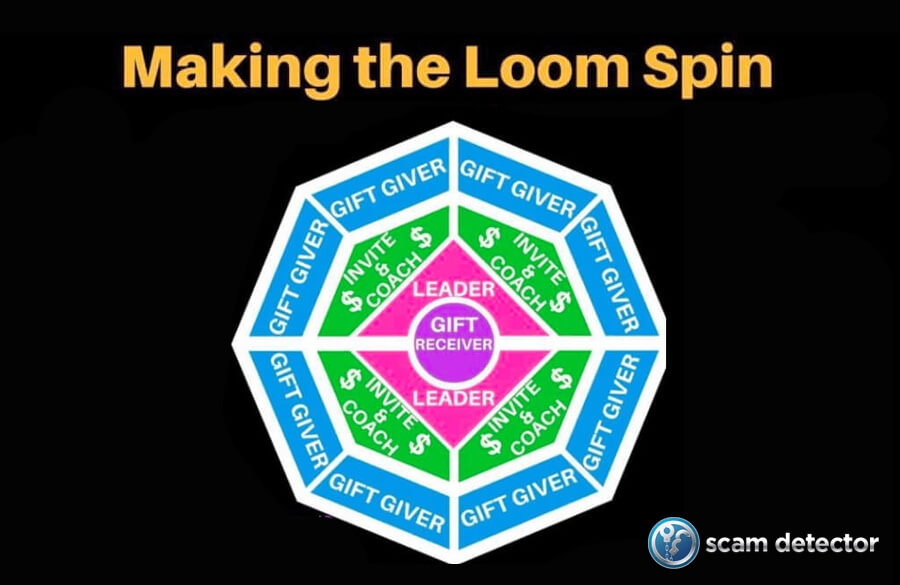Blessing Loom Scam: How It Works
Have you heard of the Blessing Loom movement? Well, maybe the word ‘movement' is a bit too much in this context. The Blessing Loom aka the Gifting Tables Scam is a pyramid scheme that's been going around for a while. However, it flourished (no pun intended) over the last few weeks because people are more concerned about their financial stability during the pandemic. Let's take a closer look at how the scam works, how you can avoid it, and how to report it. Feel free to expose the name of the scammer in the Comments section if you've been approached with the Blessing Loom offer.
It works like this:
Scam Detectors Most Trusted Websites in Online Security
- Guard.io (100): Surf the web safely. Clean up your browser, remove maliscious extensions and check for privacy violations.
- Incogni.com (100): Delete your personal data from the internet and protect against scams and identity theft.
- ExpressVPN (100) Stay secure and anonymous online - Best VPN Out There
- IPVansish (100) Fast VPN to stay safe and secure online with multiple discount plans.
You receive a direct message that arrives through social media platforms – Facebook, Twitter, Instagram, or even TikTok lately – by a follower, friend, or family member. The person invites you to join a Blessing Loom. Why that name? The message promotes it as a great opportunity to earn money while also “blessing others.” What do you need to do?
As it is a pyramid scheme, you are supposed to build your way up to the top, where eventually will be rewarded by those underneath you.
However, on the Blessing Loom, it is more like a circle within a circle – and so on – see below a screenshot of how scammers promote their scheme:

There are gift-givers (level 1), coaches (level 2), leaders (level 3), and a gift receiver.
With a minimum investment of $100 (amount may vary from scammer to scammer) paid through PayPal, Venmo or CashApp transactions, or another digital payment service, you start as a gift-giver. You start spreading the wealth and see a significant return on the money you put in – or so you think. All you need to do is recruit a few other people to invest. They will ‘hire' even more people, and, as the circle widens, everyone makes loads of cash. That's the concept.
As you can see in the image above, if you split the circle in half – on each side, there is one team of 4 gift-givers, 2 coaches, one leader. “Each team's goal is to bless the receiver. When the receiver is fully blessed, he moves out, and one of the leaders moves in”, says the promoter of the game. Everyone advances one position until they supposedly end up in the middle. If you make it there, you are supposed to receive $100 from everyone on the board!
Sounds great, right? Not really. Like all pyramid schemes, this one relies on recruiting new individuals to keep the scam afloat. Once the players stop participating, the money supply stops as well. That leaves lots of disappointed people who lose the cash they initially invested. The amount is small, and people are usually too embarrassed to report to the police or even to admit it to their families.
Watch the video below to see the Blessing Loom Scam exposed on the news:
The Coronavirus pandemic brought up a lot of scams, mostly because they focus on two vital aspects: money and fear. Educate yourself about the newest fraudulent activities and stay alert. In this particular case, stay away from pyramid schemes – they only promise quick profits for recruiting victims. Pyramid schemes are illegal in the United States, the United Kingdom, Australia, and Canada. They are illegal in 46 other countries.
However, be aware of MLM (Multi-Level Marketing) businesses too, which are based on the same tricks, although they are technically legal everywhere. Before you accept any tempting offer whether face-to-face or on the internet, do your research thoroughly.
Besides, here is what the Better Business Bureau has to say:
“Just because something appeared to be fun and was shared by a friend, doesn't mean there isn't an inherent risk. Many of these offers include extravagant promises that aren't kept.”
“Monitor Friend Requests. Don't accept friend requests from people you don't know. Also, be wary of a second friend request from someone you are already connected with; the second profile may be an imposter trying to access your data and your friends' list.”
“Ask questions and research the offer before joining any business venture. What appears to be a legitimate investment could still be a pyramid scheme. Check business ratings and reviews on BBB.org and other search engines before agreeing to work with or invest in any company or individual.”
Blessing Loom: How To Report a Scammer
Warn your family and friends about the Blessing Loom Scam by sharing it on social media using the buttons provided. You can also officially report the scammers to the Federal Trade Commission using the link below:
How To Prevent Identity Theft and More
If you want to be the first to find out the most notorious scams every week, feel free to subscribe to the Scam Detector newsletter here. You'll receive periodic emails – we promise not to spam. Last but not least, use the Comments section below to expose other scammers.
Verify a website below
Are you just about to make a purchase online? See if the website is legit with our validator:
vldtr®


TOP 4 MUST-WATCH FRAUD PREVENTION VIDEOS
1. Top 5 Amazon Scams in 2024 2. Top 5 PayPal Scams in 2024 3. How To Spot a Scam Email in 2024
- Latest Posts by Selma Hrynchuk
-
Compromised Credit Card Scam
- -
Fake Google Chrome Update
- -
Facebook Privacy Notice Hoax
- All Posts













